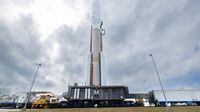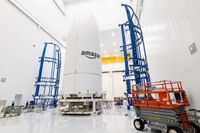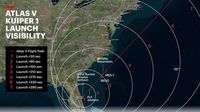On Wednesday, April 9, 2025, at 7 p.m. EDT, the United Launch Alliance (ULA) successfully launched its Atlas V rocket from Cape Canaveral Space Force Station in Florida, marking the beginning of a significant chapter in satellite communications. This launch, part of Amazon's ambitious Project Kuiper, delivered 27 satellites into low-Earth orbit, paving the way for a global broadband network designed to compete with Elon Musk's well-established Starlink system.
Project Kuiper, named after the icy Kuiper Belt beyond Neptune, aims to deploy a constellation of 3,232 satellites to provide internet service to underserved areas around the world. The Atlas V rocket, equipped with five side-mounted boosters, was tasked with lifting the first batch of these satellites to an altitude of 280 miles (approximately 450 kilometers) above Earth. Each satellite is designed to travel at speeds exceeding 17,000 miles per hour, completing an orbit around the planet approximately every 90 minutes.
According to ULA, the launch window extended for two hours, allowing for optimal conditions to ensure a successful lift-off. As spectators gathered along Florida's Space Coast, many were eager to witness the historic moment. "Once the satellites have successfully separated from the rocket, they will begin a series of mostly automated steps to activate onboard systems and use their electric propulsion systems to gradually ascend to their assigned orbit," stated Amazon in a press release regarding the launch.
Visibility of the launch extended far beyond Florida, with reports indicating that residents in cities as far away as Jacksonville and Miami could potentially see the rocket's ascent, depending on weather conditions. ULA provided a visibility map, indicating that the Atlas V's flight path would allow for observation along much of the eastern seaboard of the United States. For instance, parts of New Jersey were expected to catch a glimpse of the rocket about 330 seconds after launch.
In preparation for this launch, Amazon has invested heavily in its satellite division, constructing a $120 million, 100,000-square-foot complex at NASA's Kennedy Space Center. This facility will play a crucial role in the assembly and preparation of the remaining satellites for future launches. ULA plans to execute a total of eight Atlas V and 38 Vulcan rocket launches as part of the Project Kuiper mission.
As the launch approached, excitement built across social media platforms, with many users sharing their anticipation and previous launch experiences. The ULA livestream provided real-time updates and insights into the preparations leading up to the historic moment. The launch was not only a significant milestone for Amazon but also a demonstration of the growing competition in the satellite internet sector.
Project Kuiper's launch comes at a time when the demand for global internet access is more pressing than ever. With millions still lacking reliable connectivity, Amazon's initiative aims to bridge this digital divide. However, it faces stiff competition from SpaceX's Starlink, which has already deployed over 7,000 satellites and started providing service to customers since 2019.
Despite the competitive landscape, Amazon's Project Kuiper has received approval from the U.S. Federal Communications Commission (FCC) to operate its satellite constellation. However, the company has indicated that it will not begin offering services until at least 578 satellites are successfully launched, meaning there is still a significant journey ahead.
As the Atlas V rocket roared into the night sky, many onlookers were treated not only to a visual spectacle but also to the thunderous sound of the launch, which could be heard miles away. "A rocket launch can be a treat for the ears too: on the Space Coast, a 'rumble' can be heard or window-shaking can be expected in some parts of Brevard County after liftoff," noted local reports.
In addition to the technical achievements, the launch also highlighted the ongoing evolution of space exploration and commercial endeavors in the aerospace sector. Jeff Bezos, the founder of Amazon, has positioned himself as a key player in this rapidly changing landscape, stepping down as CEO in 2021 to focus on his role as executive chairman and other ventures, including space exploration through his company Blue Origin.
As Project Kuiper progresses, it will be interesting to see how it develops in comparison to Starlink. While Starlink has already established a significant presence, Kuiper's ambitious plans and substantial investment could lead to a competitive rivalry that benefits consumers around the globe.
With the successful launch of the Atlas V rocket, Amazon has taken a critical first step towards realizing its vision of a connected world. As the company prepares for future launches, the implications of this project extend far beyond the realm of satellite communications, potentially reshaping the way people access information and connect with one another.
As observers look to the future, one can't help but wonder: will Project Kuiper be able to catch up to its competitors, or will it carve out its own niche in the ever-expanding universe of satellite internet? Only time will tell, but for now, the launch of the Atlas V marks a promising beginning.



